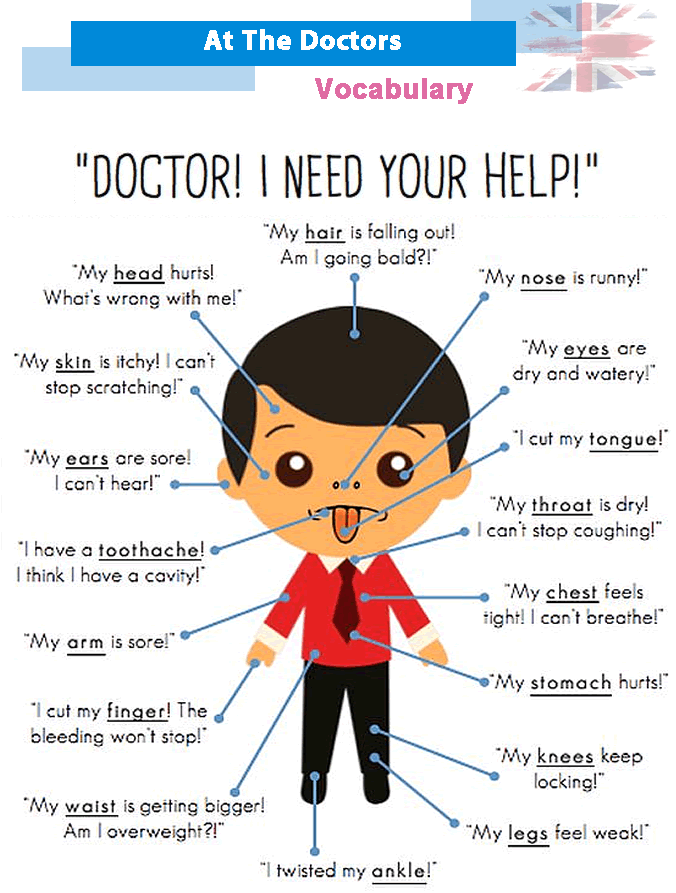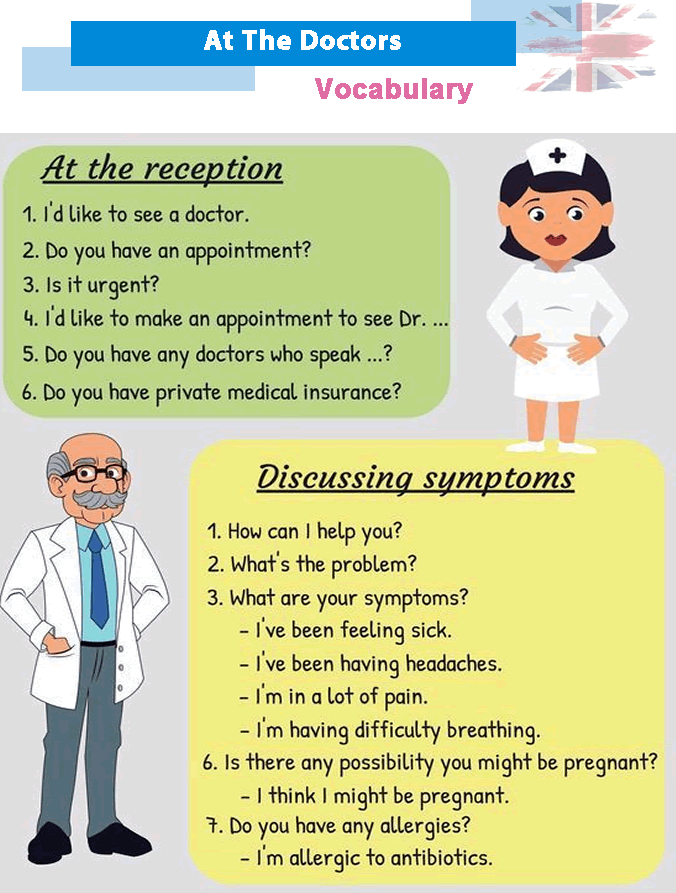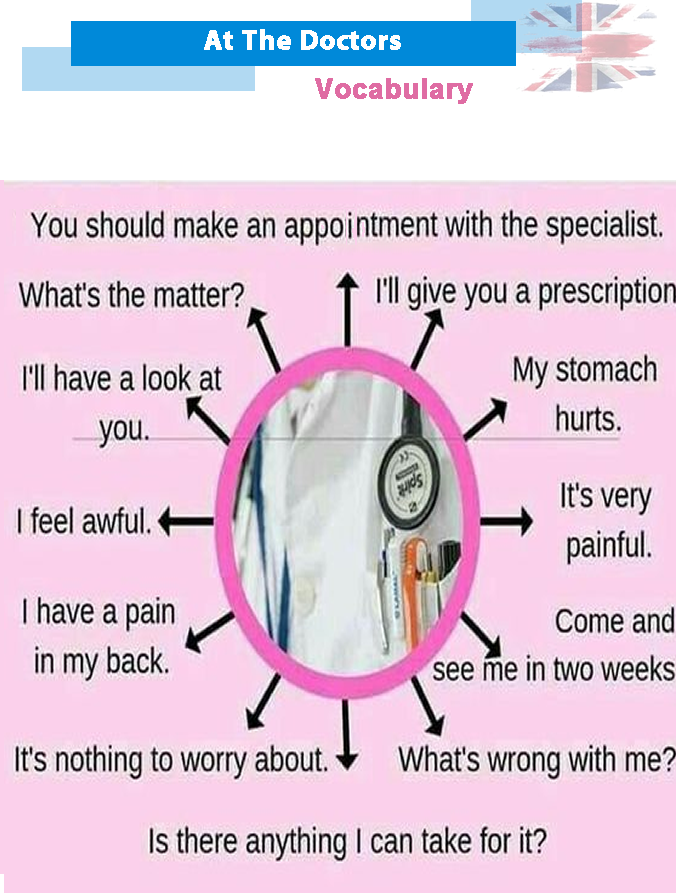
Key Phrases for Visiting the Doctor with Examples and Meanings
Visiting the doctor can be a daunting experience, especially when navigating a language barrier. Understanding and using the right vocabulary can make these visits smoother and less stressful. This lesson will cover essential phrases and vocabulary you might encounter at a doctor's appointment, providing over 80 examples with their meanings to enhance your medical English skills.
This lesson is designed to help you communicate effectively with healthcare professionals. You'll learn how to describe symptoms, understand common questions and responses, and engage in conversations that typically occur during a visit to the doctor.
By the end of this lesson, you will be equipped with the language skills needed to handle medical appointments confidently. Whether you need to make an appointment, discuss symptoms, or understand the doctor's advice, this comprehensive guide will prepare you for various scenarios.
Useful Vocabulary for Visiting the Doctor
In this section, we'll explore specific phrases and vocabulary relevant to visiting the doctor. Each term will be accompanied by a detailed meaning and example sentences to illustrate its usage in context.
At the Reception
-
I'd like to see a doctor.
Meaning: You want to have a consultation with a doctor.
Example: I'd like to see a doctor about my back pain.
Example: Good morning, I'd like to see a doctor today.
Example: I'd like to see a doctor as soon as possible. -
Do you have an appointment?
Meaning: Asking if you have scheduled a time to see the doctor.
Example: Do you have an appointment with Dr. Smith?
Example: Do you have an appointment for today?
Example: Do you have an appointment or are you here for a walk-in? -
Is it urgent?
Meaning: Asking if the situation requires immediate attention.
Example: Is it urgent, or can it wait until tomorrow?
Example: The receptionist asked if it was urgent.
Example: Is it urgent, or would you like to book an appointment? -
I'd like to make an appointment to see Dr. ...
Meaning: Requesting to schedule a consultation with a specific doctor.
Example: I'd like to make an appointment to see Dr. Johnson.
Example: Can I make an appointment to see Dr. Williams?
Example: I'd like to make an appointment to see Dr. Brown next week. -
Do you have any doctors who speak ...?
Meaning: Inquiring if there are doctors who speak a particular language.
Example: Do you have any doctors who speak Spanish?
Example: I'd prefer a doctor who speaks French, do you have any?
Example: Do you have any doctors who speak German? -
Do you have private medical insurance?
Meaning: Asking if you have insurance that covers medical expenses.
Example: Do you have private medical insurance for this visit?
Example: The clinic asked if I have private medical insurance.
Example: Do you have private medical insurance or will you pay out of pocket?
Discussing Symptoms
-
How can I help you?
Meaning: Asking how assistance can be provided.
Example: How can I help you today?
Example: The nurse asked, "How can I help you?"
Example: How can I help you with your symptoms? -
What's the problem?
Meaning: Asking what issue or symptom you are experiencing.
Example: What's the problem you're experiencing?
Example: The doctor asked, "What's the problem?"
Example: Can you tell me what's the problem? -
What are your symptoms?
Meaning: Asking for a description of your symptoms.
Example: What are your symptoms today?
Example: The doctor asked, "What are your symptoms?"
Example: Please describe what are your symptoms. -
I've been feeling sick.
Meaning: You have been experiencing illness.
Example: I've been feeling sick for a few days.
Example: I told the doctor, "I've been feeling sick."
Example: I've been feeling sick and weak. -
I've been having headaches.
Meaning: You have been experiencing headaches.
Example: I've been having headaches every morning.
Example: The patient said, "I've been having headaches."
Example: I've been having headaches and dizziness. -
I'm in a lot of pain.
Meaning: You are experiencing significant pain.
Example: I'm in a lot of pain in my lower back.
Example: I explained to the doctor, "I'm in a lot of pain."
Example: I'm in a lot of pain and need relief. -
I'm having difficulty breathing.
Meaning: You are experiencing trouble breathing.
Example: I'm having difficulty breathing when I exercise.
Example: The patient said, "I'm having difficulty breathing."
Example: I'm having difficulty breathing and it's worrying me. -
Is there any possibility you might be pregnant?
Meaning: Asking if there is a chance you could be pregnant.
Example: The doctor asked, "Is there any possibility you might be pregnant?"
Example: Is there any possibility you might be pregnant?
Example: Considering your symptoms, is there any possibility you might be pregnant? -
I think I might be pregnant.
Meaning: You suspect you could be pregnant.
Example: I think I might be pregnant, can you check?
Example: I told the nurse, "I think I might be pregnant."
Example: I think I might be pregnant and need a test. -
Do you have any allergies?
Meaning: Asking if you have allergic reactions to substances.
Example: Do you have any allergies to medications?
Example: The doctor asked, "Do you have any allergies?"
Example: Do you have any allergies we should be aware of? -
I'm allergic to antibiotics.
Meaning: You have an allergy to antibiotics.
Example: I'm allergic to antibiotics, please note that.
Example: The patient said, "I'm allergic to antibiotics."
Example: I'm allergic to antibiotics and need alternative medication.
Describing Specific Symptoms
-
My hair is falling out! Am I going bald?!
Meaning: You are experiencing hair loss and concerned about baldness.
Example: My hair is falling out! Am I going bald?!
Example: The patient worriedly asked, "My hair is falling out! Am I going bald?!"
Example: My hair is falling out! Am I going bald?! What should I do? -
My head hurts! What's wrong with me?!
Meaning: You have a headache and are concerned about the cause.
Example: My head hurts! What's wrong with me?!
Example: I exclaimed, "My head hurts! What's wrong with me?!"
Example: My head hurts! What's wrong with me?! Can you help? -
My skin is itchy! I can't stop scratching!
Meaning: You have itchy skin and can't stop scratching it.
Example: My skin is itchy! I can't stop scratching!
Example: The patient said, "My skin is itchy! I can't stop scratching!"
Example: My skin is itchy! I can't stop scratching! What could it be? -
My nose is runny!
Meaning: You have a runny nose.
Example: My nose is runny and it's annoying.
Example: I told the doctor, "My nose is runny."
Example: My nose is runny! Is it a cold? -
My eyes are dry and watery!
Meaning: You are experiencing dryness and wateriness in your eyes.
Example: My eyes are dry and watery, what should I do?
Example: The patient said, "My eyes are dry and watery."
Example: My eyes are dry and watery! Is it an allergy? -
My ears are sore! I can't hear!
Meaning: You have sore ears and difficulty hearing.
Example: My ears are sore! I can't hear properly!
Example: I explained, "My ears are sore! I can't hear!"
Example: My ears are sore! I can't hear! Can you check? -
I cut my tongue!
Meaning: You have injured your tongue.
Example: I cut my tongue while eating.
Example: The patient said, "I cut my tongue!"
Example: I cut my tongue! Is it serious? -
My throat is dry! I can't stop coughing!
Meaning: You have a dry throat and persistent cough.
Example: My throat is dry! I can't stop coughing!
Example: I told the nurse, "My throat is dry! I can't stop coughing!"
Example: My throat is dry! I can't stop coughing! What can I do? -
I have a toothache! I think I have a cavity!
Meaning: You have tooth pain and suspect a cavity.
Example: I have a toothache! I think I have a cavity!
Example: The patient said, "I have a toothache! I think I have a cavity!"
Example: I have a toothache! I think I have a cavity! Can you help? -
My arm is sore!
Meaning: You have pain in your arm.
Example: My arm is sore after lifting weights.
Example: The patient said, "My arm is sore!"
Example: My arm is sore! Can you check it? -
My chest feels tight! I can't breathe!
Meaning: You have tightness in your chest and difficulty breathing.
Example: My chest feels tight! I can't breathe properly!
Example: I explained, "My chest feels tight! I can't breathe!"
Example: My chest feels tight! I can't breathe! Is it serious? -
My stomach hurts!
Meaning: You have pain in your stomach.
Example: My stomach hurts after eating.
Example: The patient said, "My stomach hurts!"
Example: My stomach hurts! What could it be? -
I cut my finger! The bleeding won't stop!
Meaning: You have injured your finger and it is bleeding continuously.
Example: I cut my finger! The bleeding won't stop!
Example: The patient exclaimed, "I cut my finger! The bleeding won't stop!"
Example: I cut my finger! The bleeding won't stop! What should I do? -
My waist is getting bigger! Am I overweight?!
Meaning: You are concerned about gaining weight.
Example: My waist is getting bigger! Am I overweight?!
Example: I asked, "My waist is getting bigger! Am I overweight?!"
Example: My waist is getting bigger! Am I overweight?! Should I be worried? -
My knees keep locking!
Meaning: Your knees are frequently stiffening or locking up.
Example: My knees keep locking when I walk.
Example: The patient said, "My knees keep locking!"
Example: My knees keep locking! What could be the cause? -
My legs feel weak!
Meaning: You are experiencing weakness in your legs.
Example: My legs feel weak after standing for a long time.
Example: I explained, "My legs feel weak!"
Example: My legs feel weak! Is it a sign of something serious? -
I twisted my ankle!
Meaning: You have injured your ankle by twisting it.
Example: I twisted my ankle while running.
Example: The patient said, "I twisted my ankle!"
Example: I twisted my ankle! Is it sprained?

At the Doctor's Office
-
You should make an appointment with the specialist.
Meaning: Advising to schedule a consultation with a specialist.
Example: You should make an appointment with the specialist for further tests.
Example: The doctor said, "You should make an appointment with the specialist."
Example: You should make an appointment with the specialist to get a proper diagnosis. -
What's the matter?
Meaning: Asking what the issue or problem is.
Example: What's the matter with your knee?
Example: The doctor asked, "What's the matter?"
Example: Can you tell me what's the matter? -
I'll give you a prescription.
Meaning: The doctor will provide a written order for medication.
Example: I'll give you a prescription for antibiotics.
Example: The doctor said, "I'll give you a prescription."
Example: I'll give you a prescription to help with your pain. -
I'll have a look at you.
Meaning: The doctor will examine you.
Example: I'll have a look at you and see what's wrong.
Example: The doctor said, "I'll have a look at you."
Example: I'll have a look at you to diagnose the issue. -
My stomach hurts.
Meaning: You have pain in your stomach.
Example: My stomach hurts after eating.
Example: The patient said, "My stomach hurts."
Example: My stomach hurts and I feel nauseous. -
I feel awful.
Meaning: You are feeling very unwell.
Example: I feel awful and can't get out of bed.
Example: The patient said, "I feel awful."
Example: I feel awful; what could be wrong? -
I have a pain in my back.
Meaning: You are experiencing back pain.
Example: I have a pain in my back after lifting something heavy.
Example: The patient said, "I have a pain in my back."
Example: I have a pain in my back that won't go away. -
It's very painful.
Meaning: The pain is intense.
Example: It's very painful when I move my arm.
Example: The patient said, "It's very painful."
Example: It's very painful; what can I do for relief? -
Come and see me in two weeks.
Meaning: Advising to return for a follow-up appointment.
Example: Come and see me in two weeks for a check-up.
Example: The doctor said, "Come and see me in two weeks."
Example: Come and see me in two weeks to monitor your progress. -
It's nothing to worry about.
Meaning: Reassuring that the issue is not serious.
Example: It's nothing to worry about; just take these pills.
Example: The doctor said, "It's nothing to worry about."
Example: It's nothing to worry about; you'll be fine in a few days. -
What's wrong with me?
Meaning: Asking for a diagnosis of your condition.
Example: What's wrong with me? Why do I feel this way?
Example: The patient asked, "What's wrong with me?"
Example: Can you tell me what's wrong with me? -
Is there anything I can take for it?
Meaning: Asking if there is medication available for relief.
Example: Is there anything I can take for it to feel better?
Example: The patient asked, "Is there anything I can take for it?"
Example: Is there anything I can take for it to reduce the pain?

Summary and Takeaways
In this lesson, we covered essential vocabulary and phrases for visiting the doctor, providing over 80 examples to help you communicate effectively in medical settings. You learned how to make appointments, describe symptoms, understand common questions and responses, and engage in conversations that typically occur during a doctor's visit.
Practising these phrases will enhance your confidence and ability to handle medical appointments in English. Whether you need to make an appointment, discuss symptoms, or understand the doctor's advice, this comprehensive guide equips you with the necessary language skills.
Exercises
- Role-Playing: Practise these phrases with a partner, taking turns being the patient and the receptionist or doctor.
- Writing Practice: Write a dialogue between a patient and a doctor using the phrases learned in this lesson.
- Listening Practice: Watch medical dramas or listen to health-related podcasts and note down any new vocabulary or phrases.
By mastering these expressions, you'll be able to navigate medical appointments more effectively and with greater ease. Remember to regularly review and practise the phrases to reinforce your learning.
Share this lesson with others and visit our Facebook page at www.facebook.com/learningenglishfree.co.uk for more lessons and tips. Join our community for ongoing support and resources to enhance your English learning journey.
